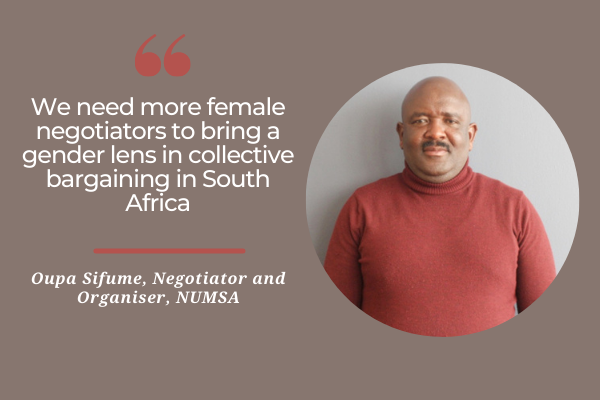Oupa Sifume (54) is a negotiator and organiser in the motor industry pillar of the National Union of Metalworkers of South Africa (NUMSA). Comrade Sifume oversees six locals and develops strategies for bargaining and representing members at the Commission for Conciliation and Mediation (CCMA).
What is the state of collective bargaining in South Africa?
Collective bargaining is under attack and strong unions are required to successfully take on employers. The inflation and poor state of the economy are affecting particularly the poorly paid workers. We push hard for better wages and working conditions but the bosses continue to use old and new tactics to reject the demands of unions. For example, some companies often claim they aren’t performing well and therefore can’t afford to pay better wages. Other companies retrench workers to increase their profits. New workplace issues, including, the future of work, the fourth industrial revolution, climate change, the increasing number of workers in vulnerable employment and the violence and harassment, require unions to build solidarity and develop appropriate responses. NUMSA will continue to contribute to this discourse until the inequality in our society is addressed. We will continue to make use of relevant research and information. Collective bargaining resources such as the LRS Bargaining Benchmarks and Inflation Monitor, which provide negotiators with key information for preparing successfully for negotiations, are incredibly valuable. The learning spaces that our unions, the LRS and other labour support organisations create provide the opportunity to share knowledge, information and experiences. The spaces are helping us to gather and renew our thinking on how to address the challenges faced by workers in South Africa.
If a company’s claims of non-performance are true, what can unions get for exercising wage restraint?
Whether a company’s claim of non-performance is genuine or not is beside the point – workers expect fair wages and good working conditions. There are many things unions can ask for exercising wage restraint. The first thing would be to secure the existing wages and jobs of our members and ensure that any remedial action by the company is fair and lawful. It is important to keep pushing for the implementation of the existing laws and collective agreements and to refrain from negotiating for issues that are granted in existing laws and agreements. We’d ask for things that empower workers, for example, training and upskilling. Trained workers gain better prospects. Unfortunately, not all companies want to invest in training and this mindset must change. I think that empowered workers can contribute to reducing the incidences of strikes. Worker leaders must be familiar with workers’ issues, the governing labour laws and agreements, as well as how to deal with errant employers.
What is the state of workers’ education today?
The workplace is changing. Technology is affecting how companies operate and there are currently many grey areas. Unions and workers must adapt to new realities and have concrete responses. Worker leaders know they must make sacrifices, including taking unpaid leave, to attend training. Shop stewards are legally entitled to time off for training by their respective unions. Unfortunately, not all bosses give stewards the time off to perform union duties for various reasons. NUMSA’s training starts on the shop floor during recruitment. We insist on effective worker leaders who are committed and willing to learn. The union facilitates training for worker leaders to learn the various labour laws, the existing platforms for bargaining and how to handle issues such as disciplinary hearings.
NUMSA is male-dominated. But we are conscious of gender issues and we are seeking to be more inclusive. We encourage our female comrades to take up leadership roles although norms such as patriarchy and the gender division of labour stifle our efforts. We need more sensitisation to ensure all women are actively involved in unions. Women’s representation in bargaining processes is important because they can articulate and motivate issues that affect women workers better than men would. We need more female negotiators to bring a gender lens to the union. NUMSA’s motor industry currently has three women negotiators. Despite the efforts of unions, worker education has declined. The thing is, you can’t take a horse to the river and force it to drink. Worker leaders must be committed and willing to learn.







